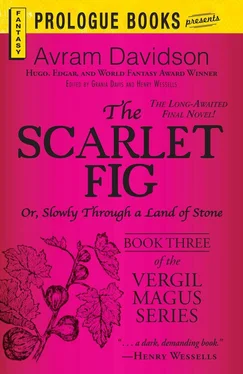“Each of us shall set down what each has to offer,” said Huldah. “And then we shall part again. And we shall consider, you and I, if each accounts the other’s offer worth the full value of what the other wants.
“And then … we shall see. Shan’t we. You will have supposed,” she said “that other men have been here and have asked, ‘Let me stay here, Huldah,’ and I have sent them all away, some with a pleasant word and a present; and some with such sayings as, ‘First fetch me what lies upon the Golden Table of Apollo in the South — would you wish to know what lies there? then you must go forth, venture, and seek; I don’t urge it’ — or some like words, largely worthless: why rob Apollo, never has Apollo robbed me, and perhaps risk a dragonvisit, or a plague or mice? And to some, some very, very few, who have said, ‘Come with me away, thou Huldah,’ to them I have said what I have said to you, just now.” Only a breath she tarried, then asked the question which troubled and trembled in his heart: “How many have returned, of either sort? Oh, none have returned. Not one. Not even a single, single one.”
He parted from her, then walked across the scented floor of scented wood, to the end of the room, that long room; then he walked back. He stood before her again, but they did not then embrace again. “I see it must be so,” he said. “You are not a woman who says no merely in order that I should try persuade her to say yes. And so, surely not as a consideration of commerce, but just as a gift from me to thee,” from his pouch he took the patch of golden fleece and from it he took the two rings of orichalcum in their incredible juxtaposition; saying further, “This is neither the Riddle of the Sphynx nor yet the Gordian knot.”
“Yet a rare thing, of great value,” she said. “I felt … something … not describable … when you placed it in my hand. I am not necessarily expected to solve this matter. But it abides with me as a thing of memory of you, not that I should forget, but this is a memory which I can touch. Well. You will go. And now I tell you what I have told no other. I shall, after a reasonable while plus a, shall we say, even an unreasonable while, expect your coming. Your return. I shall arrange for the Veil of Isis to lift, upon your approach. Make a plan, a sketch, a map and notes, of this place — a periplus, call it. Or a chart. Not forgetting the headland. And on that headland, when the moon is dark, if I sense your approach, I shall light a fire for you to see—”
“Ah, I wish it were the Pharos of Alexandria!”
“— it is not. — a fire for you to see, and by which to guide you.” She fell silent, contemplating, brow pressed down, lips uttering soft thought he could not hear; then her face opened and she smiled on him. “And in case, by reason of cloud or rain, over which my skill is limited — it is easier, if not easy, to make rain than to make rain cease — you might not see the fire, or should the winds bring you too far out of sight as you pass by this fire, I shall kindle it and fuel it with scented wood alone: calamus and quinnamon and citron-wood and of the roots of nard and of the twigs of thyme, of juniper, cedar, and of such sundry others as, of yet, I do not know.
“So even though you might not see the guiding fire, yet you shall know that it be there, I shall send a wind of far fetch so that the air and breeze shall bring you scented notice of me, for I am Huldah, and I am the headland and the winding river and the sheltering port as well.” (And all the while as, later, he was bound away, he saw her in the sheltering port’s placid wavelets and in the undulations of the winding river and in the cliffs and crannies of the headlands: and even, her face burned upon the waters of the open sea for many leagues and many.) Yet another moment she hesitated, and then she said, without change of countenance or voice, “And don’t fear, thou Messer Vergil, that however long thou tarriest, if even past time that I have ceased to wait daily for thy coming, that ever I shall make that fire a funeral fire —”
“ Absit omen! ” and thrice he spet upon that perfumed floor and thrice he rapped his knuckle-bones upon the wooden pillar he stood next to, so that the dryad which had dwelt within the tree, and might dwell there still, should hearken and prevent any possibility of coming true the words which the woman had said should not come true: she had had the thought: therein a danger. And Absit omen , he said, yet once again.
He met her eyes, those agate-colored eyes, in which he had seen the gleamings and the glisterings of far-off fires in nights by far-distant shores and in distant lands of interior. “I, more worth than that,” she said.
“ Ah, Huldah— ”
“For I am, after all, Huldah of Huldah. And I am far more worth than that.” She stopped and stooped and picked up her little cat-creature, which he had not seen nor heard enter the room. It made a sound to her, and she held it close her face, and the two faces looked upon him. A slight and aimless question he now asked of her, as one will do, to break silence. “What is biss’s name?” he asked.
And, in an odd, and yet it appeared and seemed an appropriate, tone, the question was answered him. “My name is Huldah,” said the creature.

Long he stayed there, and now and then he rose and paced, up and down, up and down that fragrant perfumed floor made of a wood whose name he had somehow never yet asked; fragrance he had never known before but which he knew he would never forget and would recognize were he ever to scent it again, even on the phoenix pyre, did the Fates yield him even that; and then he stood there long again, till the very fire upon the hearth burned down and he saw the embers dying, dying, and it seemed to him that he saw the dying embers of Carthage, Troy and Babylone, and it seemed to him that he saw them reflected in two pairs of eyes, and long he stayed there, then, again.
When he heard sounds of footfalls upon the path he did not, really, rouse himself. But out of his reverie he asked. “What thing, and who?”
It seemed the man’s voice was full of much relief. “The boat, Ser Vergil. She’s full, and fit, and ready now to sail upon the morning’s tide;” the early mornings tide that meant. He had known, been knowing, that this must very soon come, but had put the knowing away from him: could do so no more. Huldah had gone, and the knowledge of his own going had now come.
“Go, then,” said Vergil. “I follow.” Follow, then, he did, when he had quickly dressed. He did not attempt to seek out Huldah again. But all the walk to the harbor and the small ship, all along as he walked, he felt himself accompanied by someone, a someone who kept out of sight. A light-limbed and a body light of weight.

Whence, then, Huldah? How came she here? Was she named for the place, or the place for her? Was there a woman named Roma in the village midst the marsh of Tiber ere Romulus butted his downy, unclosed head to force yet further milk from the she-vulp’s yielding paps? or not? Useless to ask; the Sybil at Cumae may have noted it in her books of leaves, but … the Sybil, where was she? and your mothers, do they live forever? Who Huldah’s parents were and where they had come from, these things he knew: but as to why they had left the tideless Inland Sea to settle here upon the Coasts of Ocean, this she had not told him. How did she live? She had of course her farms and fruit trees, her hares and poultry, including those harsh-voiced speckled fowl which seemed to live as much in the trees as on the ground, and of course her doves and dovecots, whence the so small eggs on which she sometimes breakfasted. Her milch-goats … And she traded. Others along that shore were obliged to use the “mute” or “dumb” or “silent” trade, but she, being trusted, not; Sometimes ships came from as far-off as Babylone : none, though, whilst he had tarried there. “Gold and grain, I buy. Local grain I sometimes buy, if there be abundance and surfeit of it,” she had said. “If there is surplus, there, away, and the grainbins cannot hold it all, they bring it hither, and I buy. Though, when I foresee drought or a bad crop coming, or when I reck a year of the locusts coming, then I send my word abroad, and grain I buy from over-the-seas; and I provide it to my people here and I sell it to those who come from the Interiors, and from far along the coasts…. far away far … as far as from the borders of those eat no grain, but only the wild fruit flesh of the forests do they eat.”
Читать дальше












